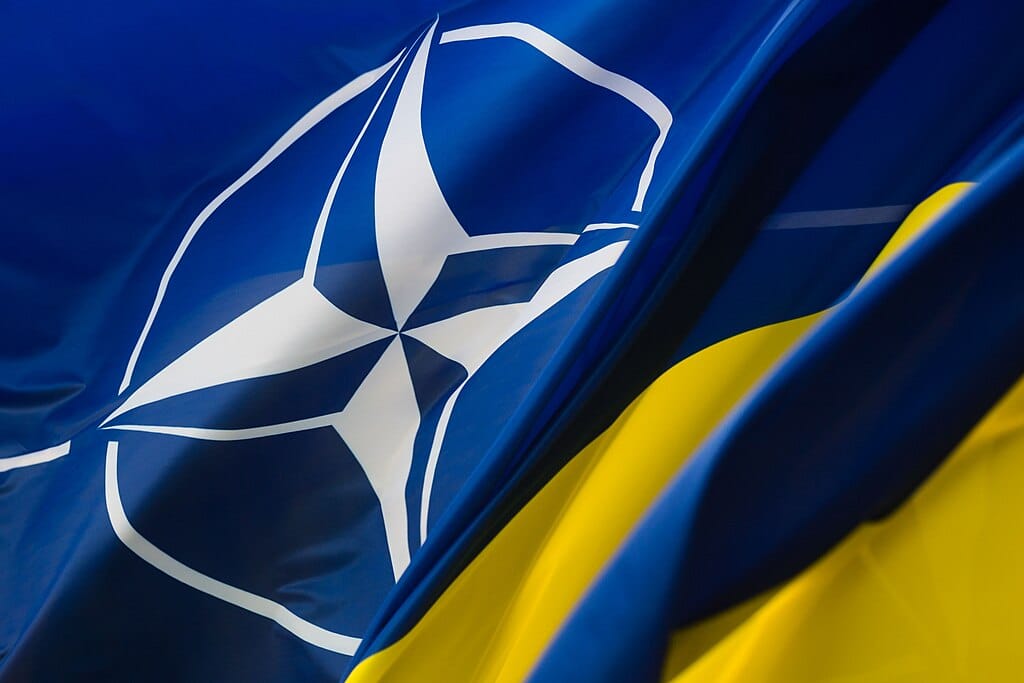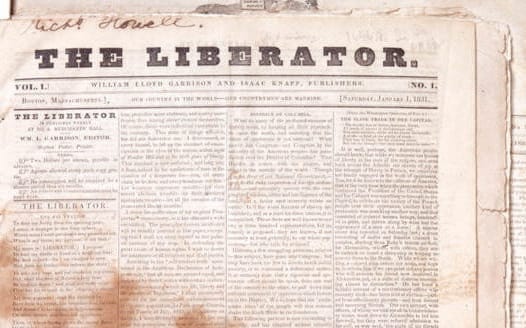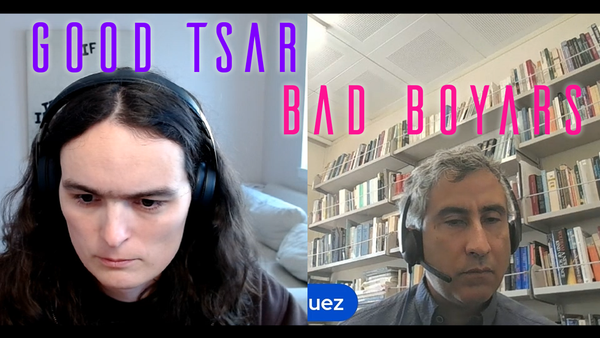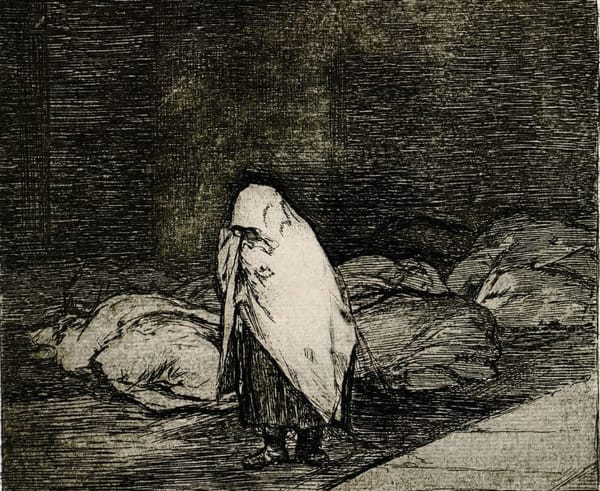Moyn's Muddle on Ukraine
Moyn makes both historical and moral errors in his analysis, and at times he uncritically adopts Putin’s perspective.

Yale historian Samuel Moyn recently published a review in Harper’s of Jonathan Haslam’s new book on the Russo-Ukraine War. His essay is representative of a broad school of thought that contends that the expansion of NATO into Eastern Europe after the Cold War provoked a harsh defensive response from Russia which culminated in the invasion of Ukraine in 2022.
Moyn makes both historical and moral errors in his analysis. He ignores Russia’s longstanding desire to dominate Eastern Europe as well as Putin’s hyper-nationalistic worldview and hatred of democracy. His use of language is manipulative, and at times he uncritically adopts Putin’s perspective.
The result is a flawed work which treats only the United States as possessing historical agency and only the United States as acting to escalate the crisis in Eastern Europe. His arguments also reflect a naïve view of global order that will only set back humane values around the world.
Who started it?
Let’s start with a revealing quote from Moyn’s piece:
Putin’s invasion has been treated in much the way many liberals have treated Trump’s rise—as an unprovoked aberration, an alien force from nowhere.
This is a double straw man. Liberals may disagree with Moyn’s sense of the origins of the Trump phenomenon, but they do not treat him as coming out of nowhere and are not monolithic in their own views.
The same goes for the Russo-Ukraine War. Most liberals recognize that the expansion of NATO and Russia’s sense of insecurity and humiliation are important structural causes of the war. Where they diverge with Moyn is on the causes, reasonableness, and ethics of that expansion and the nature of the Russian response.
NATO expansion was driven heavily by the former Warsaw Pact nations’ well-grounded fear of Russian domination. Poland, Czechoslovakia, and Hungary formed the Visegrad Group in early 1991 to push for NATO accession. The Clinton administration did not immediately support these efforts and required these nations to meet certain conditions before joining, which they eventually did in 1999.
Another group of nations, including the Baltic States, Romania, Slovakia, and Croatia, and Slovenia, formed the Vilnius Group in 2000 to push for admission. Many of these countries, including Estonia, suffered major cyber-attacks and other interference from Russia even after joining NATO. Finland and Sweden abandoned traditions of non-alignment and joined NATO in 2023 and 2024, respectively, because of a renewed sense of vulnerability after Russia’s invasion of Ukraine. Ukraine’s desire to join NATO was even more understandable, especially after Putin seized Crimea and invaded Donetsk and Luhansk in 2015 to counter Ukrainian efforts to assert greater independence.
Entering NATO was immensely popular in these nations, which makes sense for countries who had seen their sovereignty and national expression stifled by the Russian Empire and the Soviet Union. NATO membership also helped these nations succeed in transitioning to democracy. The agency of these nations, and the reasonableness of their aims, are absent from Moyn’s take and many other realist analyses of NATO expansion.
The clamoring of these nations to join NATO demonstrates a point that Moyn ignores: NATO expansionism is not a U.S. imperial plot designed to humiliate Russia but something driven significantly from the bottom-up by nations with well-founded fears of Russia. Indeed, Russia is continuing a shadow war of subversion and sabotage against government, transportation, and other infrastructure in Europe, including via explosives and cyber-attacks. In other words, Russia itself is responsible to a great degree for the fear that has driven NATO enlargement.
What about the Russians?
Moyn identifies with the realist tradition in this piece. Realists see states (or at least powerful ones) as interchangeable billiard balls that view and pursue security in the same way regardless of regime type, ideology, and so on.
An enduring problem with realism, however, is that security is constructed. Identity, memory, narrative, regime type, emotion, and culture all shape how a state defines security and behaves toward other states.
Moyn’s Russia and Putin are flattened, rationalized avatars of realist theory. They merely react to Western encroachment, lashing out in desperation like a cornered animal. Putin claimed before invading Ukraine that “we have been left no other option to protect Russia and our people,” and Moyn seems to agree.
In fact, Putin is a devoted Russian nationalist who believes that Russia has a historical right to control an Eastern European sphere of influence either by retaking “essentially” Russian territory like Ukraine or interfering in sovereign nations like the Baltic States and Romania, as he has done repeatedly. He has constructed his definition of Russian security so as to require domination and annexation.
Putin’s own words and experiences demonstrate this. As a KGB officer, he watched the Soviet empire collapse from his post in Dresden. In 2005, he called the disintegration of the Soviet Union “the greatest geopolitical catastrophe of the century,” and he fought wars in Chechnya and Georgia to arrest the further breakup of the Russian periphery.
Putin has consistently claimed that the Ukrainian nation does not exist and that it is innately Russian territory. In 2021, he issued a lengthy essay on “the Historical Unity of Russians and Ukrainians,” which declared that they were “one people” and that Ukraine had never possessed “real statehood.” In 2025, he asserted that “the whole of Ukraine is ours” and that “where the foot of a Russian soldier steps, that is ours,” a statement with tremendous potential consequences for other Eastern European nations. Ukraine was the largest republic in the Soviet Union besides Russia, so retaking it is critical to restoring Russian greatness.
This imperial vision predates Putin and NATO expansion. The Czars also held that the Ukrainian nation was a fabrication and suppressed its language and culture. The Soviet Union viewed Ukrainian nationalism as a threat and orchestrated a massive famine to suppress it. Putin’s willingness to shed appalling quantities of blood is consistent with this history and his belief, as he told President George Bush in 2008, that Ukraine “is not even a country.” Putin’s individual ideas matter, but he is also a product of this deeper pattern of Russian history, as Baiba Braze, the foreign minister of Latvia, argued: “Russian imperialism has deep roots. It predates Vladimir Putin—and will most likely outlast him.”
In arguing that NATO membership was the “precipitating cause of the war in Ukraine,” meaning an immediate event that triggers an outcome, Moyn uncritically takes Putin’s perspective. Biden did vaguely float the idea of Ukrainian membership in 2021, and there are reasonable grounds to criticize this.
But Moyn mistakes pretext for cause here, as Putin’s efforts to subjugate Ukraine have been a consistent theme of his career. He has pursued them through political proxies, electoral interference, asymmetrical warfare, and finally, a direct invasion. Moreover, despite its stated desire to enter NATO, Ukraine was nowhere near joining the alliance in 2022, a fact that Zelensky himself has acknowledged. German Chancellor Olaf Sholtz even told Putin that Ukrainian membership would be an impossibility for at least three decades. Moreover, every NATO member must agree on admitting new nations, which creates a high bar for countries like Ukraine.
That Putin is a brutal autocrat who snuffed out Russian democracy is incidental for Moyn and many realists. However, there is strong evidence that Putin fears the example of democracy in his near abroad and in the world in general. As Masha Gessen shows in their biography, Putin witnessed the Eastern Bloc collapse in part because of the mass appeal of Western democracy and prosperity. In the 2010s, he also increasingly feared that the United States was trying to overthrow him, especially after the toppling of Libyan dictator Muammar Qadhafi and U.S. support for the color revolutions in Eastern Europe. Analysts like Moyn consistently discount his paranoia, which appears to have intensified during the COVID pandemic.
Putin has concluded that his regime is safest in a world without democratic counter-examples to his own autocratic system. That is why he has backed authoritarians and sought to undermine trust in democracy and sow disinformation not only in his immediate backyard but around the world.
As a U.S. intelligence report concluded in 2023: “Russia is focused on carrying out operations to degrade public confidence in election integrity … this is a global phenomenon.” The fact that Russia also seeks to undermine the European Union, a non-military alliance, shows how his definition of security requires weakening entities that do not pose a conventional security threat. The 2014 Maidan Revolution, and Putin’s subsequent invasions, were primarily about Russia’s efforts to stop Ukrainian integration with the EU. Generally, supporting far-right, anti-EU parties like the AfD in Germany, National Rally in France, and Vox in Spain through loans, disinformation operations, and cyber-attacks offers Putin a way to subvert the European project on the cheap.
These efforts to disrupt liberal democracy cannot be divorced from Russia’s aggression against Ukraine. Ukraine is not a security menace to Russia in a military sense, but the example of a democratic, prosperous Ukraine, integrated into Europe, could be a significant political danger.
A distorted history
Moyn insists that he is not taking the Russian side but spelling out its perspective in order to puncture American self-righteousness. His framing of recent history, and his language choices, make this hard to believe.
For example, Moyn nearly adopts the Russian position on NATO’s 1999 Kosovo Intervention as an act of imperial aggression. He downplays the Russian-backed Serbian assault on the Kosovar population, which had killed thousands by early 1999 and displaced nearly half-a-million civilians. This was the same Serb government that had carried out the Srebrenica massacre, so there was reason to expect more atrocities. Moyn would have preferred the United States not “antagonize the waning Russian empire” by remaining aloof, ignoring the likelihood of even worse crimes and the relative success of NATO intervention.
Moyn’s attitude toward the color revolutions in Georgia, Ukraine, and elsewhere in the mid-2000s is equally uncritical of Russian perspectives. These pro-democracy, pro-sovereignty uprisings were direct attempts to shake off Russian political domination, but Moyn thinks they “pushed things too far,” again antagonizing Putin, who could not see anything but a Western plot in these movements.
Moyn states vaguely that the 2014 Maidan Revolution was “abetted by American meddling to some greater or lesser extent,” although the “meddling” that he and others object to seems to mostly be U.S. support for Ukrainian civil society through agencies like the National Endowment for Democracy and USAID as well as Assistant Secretary of State Victoria Nuland’s rhetorical support and (gasp) distribution of sandwiches to protestors.
Moyn’s slippery language denies Ukrainian agency and distorts recent history. He sneers that Ukrainians “have been treated as pawns for a long time—by America’s Democrats,” disregarding that the Ukrainian people are not pawns but the driving force behind sustaining a defensive war. Without offering anything specific, he claims that “the best chances for a better peace when it could have bargained from a position of strength.” In fact, Putin has rejected every off-ramp for this conflict, and his terms for peace show he still intends to reduce Ukraine to a state of vassalage.
Ukraine and world order
Moyn all but endorses Putin’s position that it has the right to control the political systems of Eastern European nations and a right to use force to ensure that domination. This is a reflection of the world that Moyn and other scholars hope will replace the U.S.-led global order: a multipolar, spheres-of-influence system that constrains U.S. hegemony and interventionism.
He writes of the necessity to “steer a multipolar world in the best direction for most people,” which requires the United States to avoid “overreach in the name of emancipatory values.” There appears to be little difference, in his mind, between the United States foolishly trying to nation-build in Iraq and Afghanistan and welcoming partners into a defensive alliance or coming to the aid of a nation suffering open aggression.
Historian Daniel Bessner, an intellectual compatriot of Moyn, goes further with this spheres of influence thinking. He suggests that “we are more likely to get a just and humane world if countries and regions are allowed to work out for themselves what kind of international ordering arrangement they desire to have…it’s actually better for regional powers to shape regional order” than for the United States to do so from a distance.
Multipolarity is becoming a reality of international politics no matter what; the important questions are what it will look like and how to adapt. But Moyn’s assessment of the Russo-Ukraine and his embrace of a neo-Metternichian view of world politics is incompatible with his hopes for a world more in line with progressive values.
It is naïve in the extreme to think that uncontested Russian and Chinese spheres would somehow be more prosperous and hospitable to democracy than the current order where the United States and its allies attempt to balance against these nations’ power and preserve a semblance of openness. Small states in these regions will have less, not more, power to work out their own destinies if the United States cedes large swathes of the world to the authoritarian powers.
The Concert of Europe offers an instructive warning here. Under the system that followed the Napoleonic Wars, reactionary monarchies respected each other’s spheres (for a while) and colluded to suppress liberal or revolutionary movements that challenged the conservative social order. Applying this model to today could promote stability, but it would be a stability of the graveyard for nations like Ukraine and a setback for liberal and democratic values.
NATO expansion was not a mistake
The risk of NATO expansion was always feeding Russian anger and insecurity. But NATO expansion did not create Russia’s ambition to retake control over Eastern Europe. That goal was consistent with centuries of Russian history and the personal worldview of Vladimir Putin.
What NATO expansion did was reset the terms of that competition in ways ultimately favorable to the United States, our European allies, and democracy in general. It prevented the return of what President Bill Clinton in 1996 called the “gray zone of insecurity” from re-emerging in Central and Eastern Europe by placing most of that region under the NATO security umbrella.
It is noteworthy that, aside from cyberattacks and low-level interference, Putin has not tried to breach the NATO firewall. This suggests it is a credible deterrent to Russian ambitions. And without NATO expansion, today we could be confronting Russian revanchism on a far larger scale. For example, the Baltic States, which former president Dmitry Medvedev called “regions of privileged interest” for Russia, would likely be under more direct assault if they were not in NATO.
There is a middle ground between Moyn’s position and that of some Ukraine boosters who are loath to recognize NATO enlargement as a structural cause of the war. NATO expansion probably contributed to Russia’s anger and its desire to retake its near abroad, although it did not create that desire. The Iraq War, moreover, certainly confirmed Putin’s suspicion that the U.S. commitment to the rules of world order was often self-serving.
But Russia is not merely reacting to the United States, and the United States is not imposing an imperial vision on docile Europeans. This view of history is a morality tale designed to cast the United States as the root of all evils and advocate for its withdrawal from much of the world. In truth, understanding how Putin and other elite Russians have defined their own security requirements and justified any means in the pursuit of those ends is paramount for explaining this war.
Featured image is Ukraine – NATO Commission chaired by Petro Poroshenko




